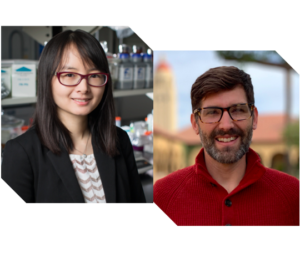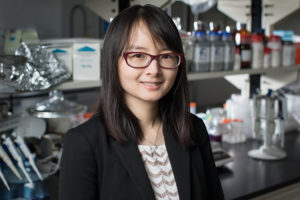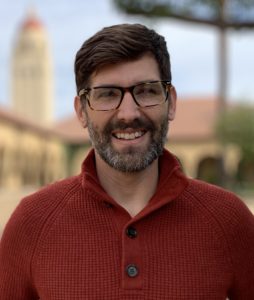
The 2022 Hanwha-TotalEnergies IUPAC Young Scientist Award, to be presented at MACRO 2022, has been awarded to Qian Chen and Eric Appel.
The Hanwha-TotalEnergies IUPAC Young Scientist Award (formerly Samsung-Total Petrochemicals – IUPAC Young Scientists Award) is dedicated to outstanding young scientists (not older than 40 years) and is sponsored by a grant from the aforementioned company. The prize was first awarded on the occasion of MACRO 2004 (Paris) and is granted biennially on the occasion of the IUPAC World Polymer Congress. The awardees are selected from the nominees by a Committee of the IUPAC Polymer Division. In the year 2022 the award will be presented at Macro2022 and there are two awardees (ex aequo) namely:
• Prof. Qian Chen, Department of Materials Science and Engineering, University of Illinois Urbana-Champaign
• Prof. Eric Appel, Department of Materials Science and Engineering, Stanford University

Qian Chen is Associate Professor at the Department of Materials Science and Engineering at the University of Illinois Urbana-Champaign (UIUC), and also affiliated to the Materials Research Laboratory, the Department of Chemistry, Department of Department of Chemical and Biomolecular Engineering, the Beckman Institute for Advanced Science and Technology, and the Carle Illinois College of Medicine.
Prof. Chen received her BS in Chemistry from Peking University (2007), and her PhD in Materials Science and Engineering from UIUC with Prof. Steve Granick (2012). She then won the prestigious Miller fellowship and worked with Prof. A. Paul Alivisatos at UC Berkeley. She joined MatSE at UIUC as an assistant professor in 2015. In 2021, she was promoted to Associate Professor with Racheff Scholarship.
Her research focuses on understanding the organization of complex materials and biological systems in space and time. Specific systems are wide-ranging and ever-expanding from ion-oxide intercalation in batteries, crumpled polymer films for water filtration, phase-changing nanoparticle ensembles as adaptive devices, ion channels gating cells, to amyloid fibril prevention for curing disease. These efforts are all unified by one common framework: deciphering fundamental rules of organization from “seeing is believing”, to resolve the dynamics of the constitutes. The implementation of such framework draws on Chen’s unique expertise in direct in-situ imaging, particularly on the groundbreaking liquid-phase transmission electron microscopy (TEM), coupled with machine learning and electron diffraction, that resolves the structure and dynamics of nanoscale entities in a suspending media. The insights obtained from filming these nanoscale events research can fill gaps in various disciplines, including materials chemistry, polymer science, biophysics, soft matter physics, and nanotechnology.
> Visit Chen homepage

Eric A. Appel is an Assistant Professor of Materials Science & Engineering at Stanford University. He received his BS in Chemistry and MS in Polymer Science from Cal Poly, San Luis Obispo. Eric performed his MS thesis research with Robert D. Miller and James L. Hedrick at the IBM Almaden Research Center in San Jose, CA. He then obtained his PhD in Chemistry working in the lab of Dr. Oren A. Scherman in the Melville Laboratory for Polymer Synthesis at the University of Cambridge. His PhD research focused on the preparation of dynamic and stimuli-responsive supramolecular polymeric materials. For his PhD work, Eric was the recipient of the Jon Weaver PhD prize from the Royal Society of Chemistry and a Graduate Student Award from the Materials Research Society. Upon graduating from Cambridge in 2012, he was awarded a National Research Service Award from the NIH (NIBIB) and a Wellcome Trust Postdoctoral Fellowship at MIT to work with Robert S. Langer on the development of supramolecular biomaterials for drug delivery and tissue engineering. For his independent work, Eric has been awarded a Hellman Faculty Scholarship, Terman Faculty Fellowship, a Margaret A. Cunningham Immune Mechanisms in Cancer Research Award, and junior faculty awards through the American Diabetes Association, the American Cancer Society, and the PhRMA Foundation. Eric also had the pleasure of participating in the Young Investigator Award Symposium from the Polymeric Materials Science & Engineering division of the American Chemical Society.
The underlying theme of the Eric’s research program integrates concepts and approaches from supramolecular chemistry, natural/synthetic materials, and biology to pursue innovative interdisciplinary science and engineering to tackle two areas of critical importance to society: advanced materials and human health. Eric’s lab focuses on developing materials for immunoengineering applications in infectious disease and cancer, drug delivery applications in the treatment of diabetes, and novel materials for wildfire prevention.
> Visit Appel homepage
> Announcement published in Chem Int July 2022, p. 24
Former awardees include Athina Anastasaki and Changle Chen (2020), Andreas Walther (2018), and to Moon Jeong Park and Brent Sumerlin (2016).
RDV@Macro2022
